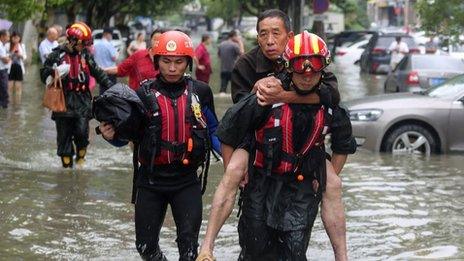Winds lash Madagascar's coast as Cyclone Freddy makes landfall
- Published
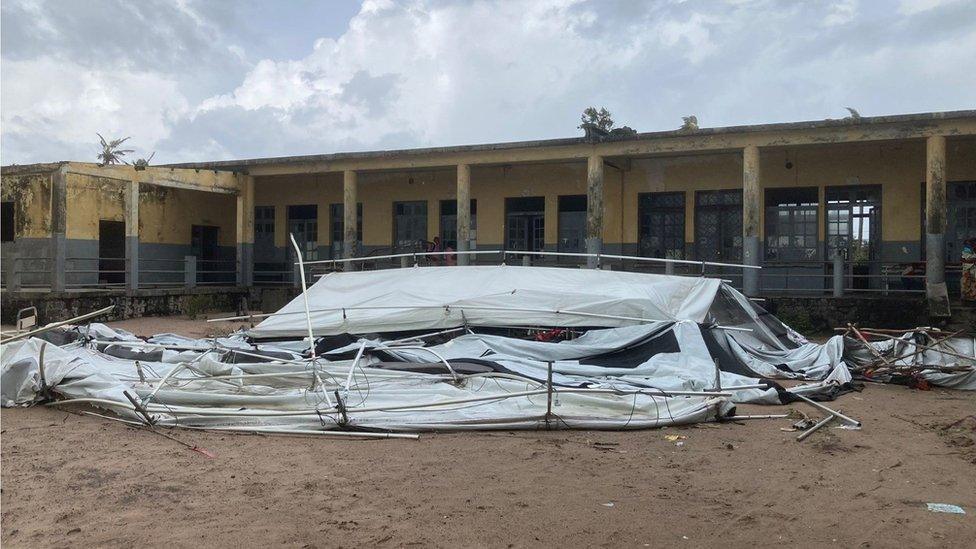
Roofs have caved in as the cyclone tore through Madagascar
At least four people have died after a tropical cyclone battered Madagascar's east coast, with heavy rain and powerful winds tearing roofs off houses and triggering a storm surge.
Cyclone Freddy made landfall on Tuesday, weeks after another tropical storm killed 33 and left thousands without shelter.
Schools have been shut and traffic has been suspended in 10 regions.
Earlier, Freddy caused some damage in Mauritius, flooding beachside hotels.
The head of Madagascar's National Office of Risk and Disaster Management told the BBC that "negligence" was to blame for the deaths.
"Despite the awareness that we spread. People still dare to ignore the instructions and the warnings," said Elack Olivier Andrikaja, adding that three of the deaths happened when a home collapsed.
However, the mayor of Mananjary, one of the worst-affected towns, said the damage was not as bad as in previous cyclones because those living close to the river had been evacuated in time.
"We were better prepared this time," Denis Franconio told the BBC's Focus on Africa programme. "Before the cyclone's arrival, the authorities, especially the central government, took the necessary measures by distributing items like rice, clothes, kitchen materials for the people in need."
However, he is worried about the future.
"People live on agriculture here and I am really concerned about famine because everything has been destroyed. First, people will need food urgently and secondly they will need seeds to ensure they can cultivate their crops."
The Indian Ocean island nation of Madagascar is particularly vulnerable to cyclones. It is hit by an average of 1.5 cyclones every year, the highest rate in Africa, according to the United Nations Office for the Co-ordination of Humanitarian Affairs.
The cyclone slightly weakened once it made landfall on Madagascar, with wind gusts exceeding 130km/h (81mph). The country's meteorological service warned that torrential rains would continue along its path.
"The sea remains very rough... and a significant risk of coastal flooding will continue overnight," it said.
A 27-year-old man drowned near the port of Mahanoro before the storm made landfall, officials said.
Officials also said 7,000 people had been pre-emptively evacuated from the coastal region directly in Freddy's path, and warnings waves could reach over 8m (26ft) were issued by the International Federation of Red Cross.
Some people used sandbags to weigh down their roofs as a precaution, but that did not stop the storm from ripping roofs off houses.
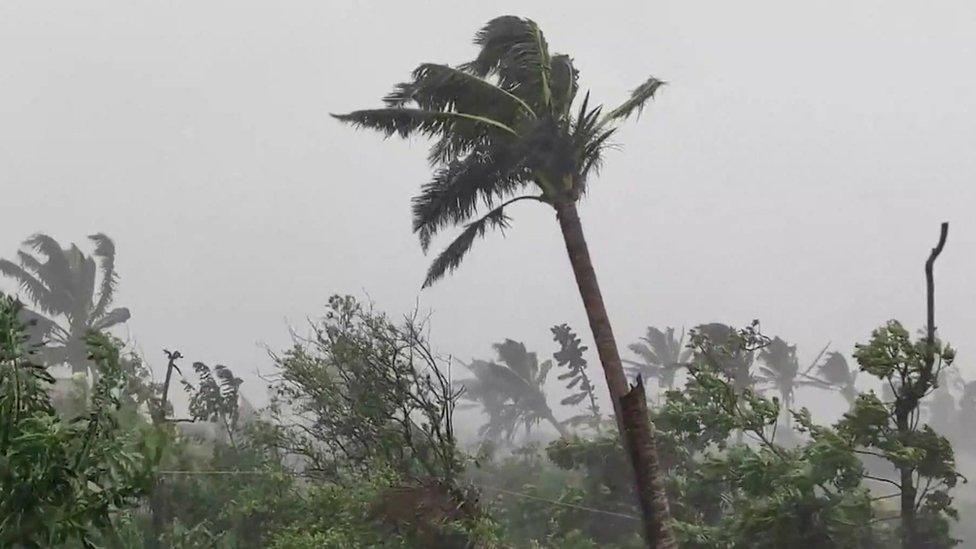
Gusts exceeding 220km (136 miles) caused a storm surge on Madagascar's east coast
"All the doors and windows started shaking," said Mananjary resident Tahina.
She had fled her home with her parents and three children to shelter in her husband's office.
"Next to us, at least five houses have lost their roofs," Tahina told AFP news agency.
Pascal Salle sobbed as he surveyed the damage caused by Freddy - which had ripped a window off of his home and turned his garden into a "sandy field".
"It's a repeat performance. I can't take this every year, it's not possible. Batsirai and Emnati in 2022, Freddy in 2023... Who's to say that in 15 days another one won't fall on us?" he said.
Last month the powerful storm Cheneso smashed into north-eastern Madagascar bringing in heavy winds and triggering downpours that caused extensive flooding, and killing at least 33 people and forcing tens of thousands of people from their homes.
Mananjary is still recovering from devastation caused by last year's Cyclone Batsirai, which killed more than 130 people across Madagascar.
Cyclone Freddy is forecast to cross the ocean from Madagascar and make landfall in Mozambique, before potentially moving further inland to hit Zimbabwe, UN officials say.
The body estimates that more than two million people could be affected.
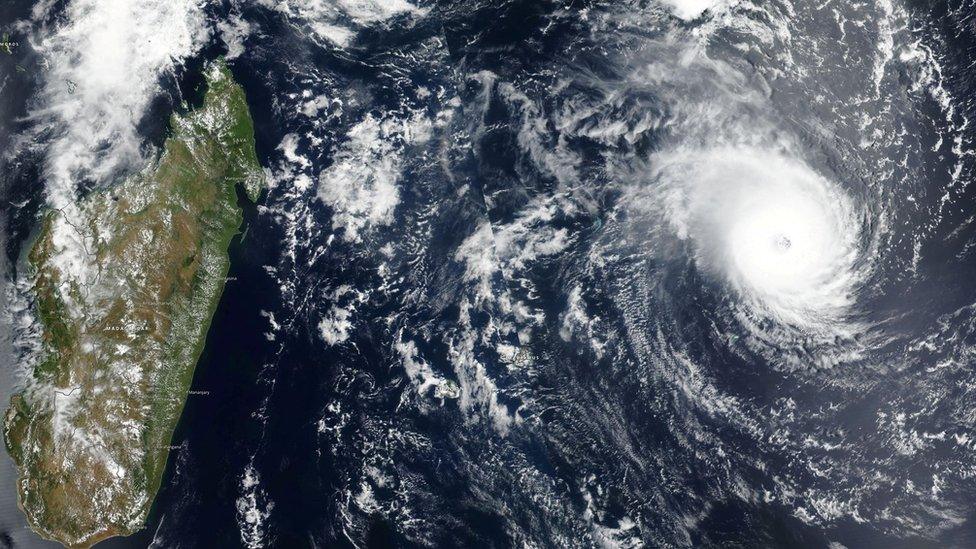
Satellite imagery shows Tropical Cyclone Freddy approaching Madagascar
Related topics
- Published29 January 2022
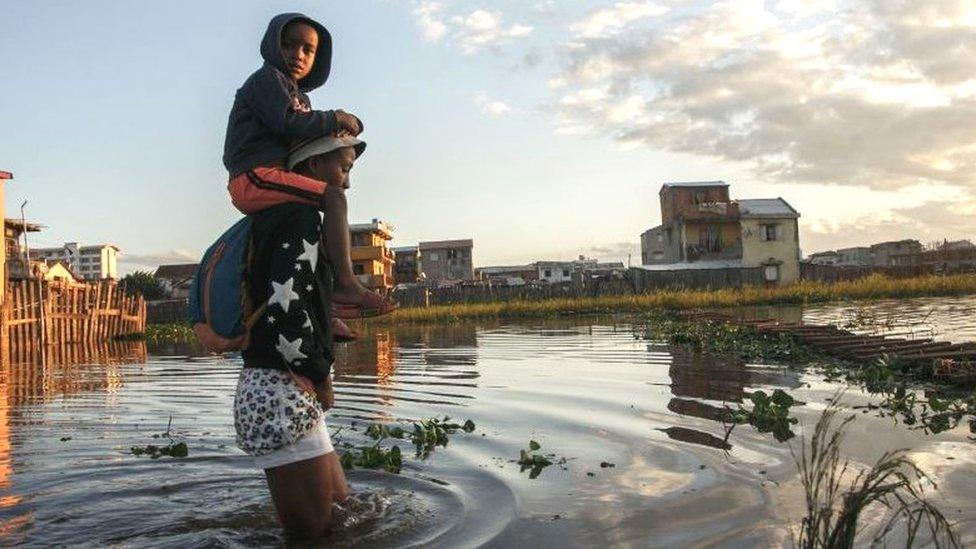
- Attribution
- Published27 January 2023
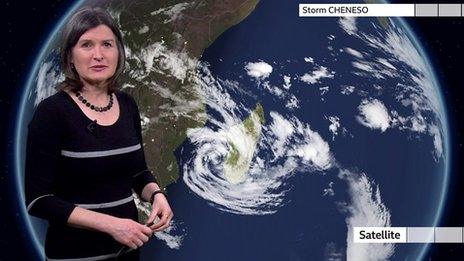
- Published4 August 2021
